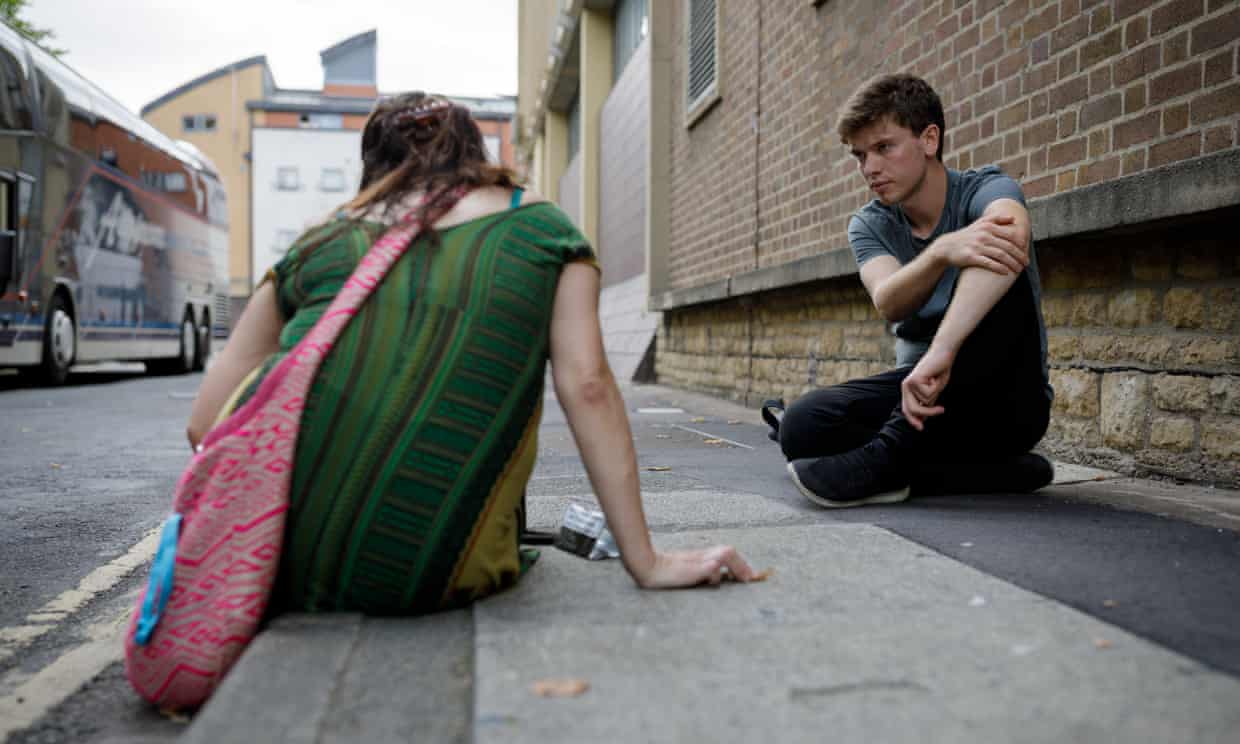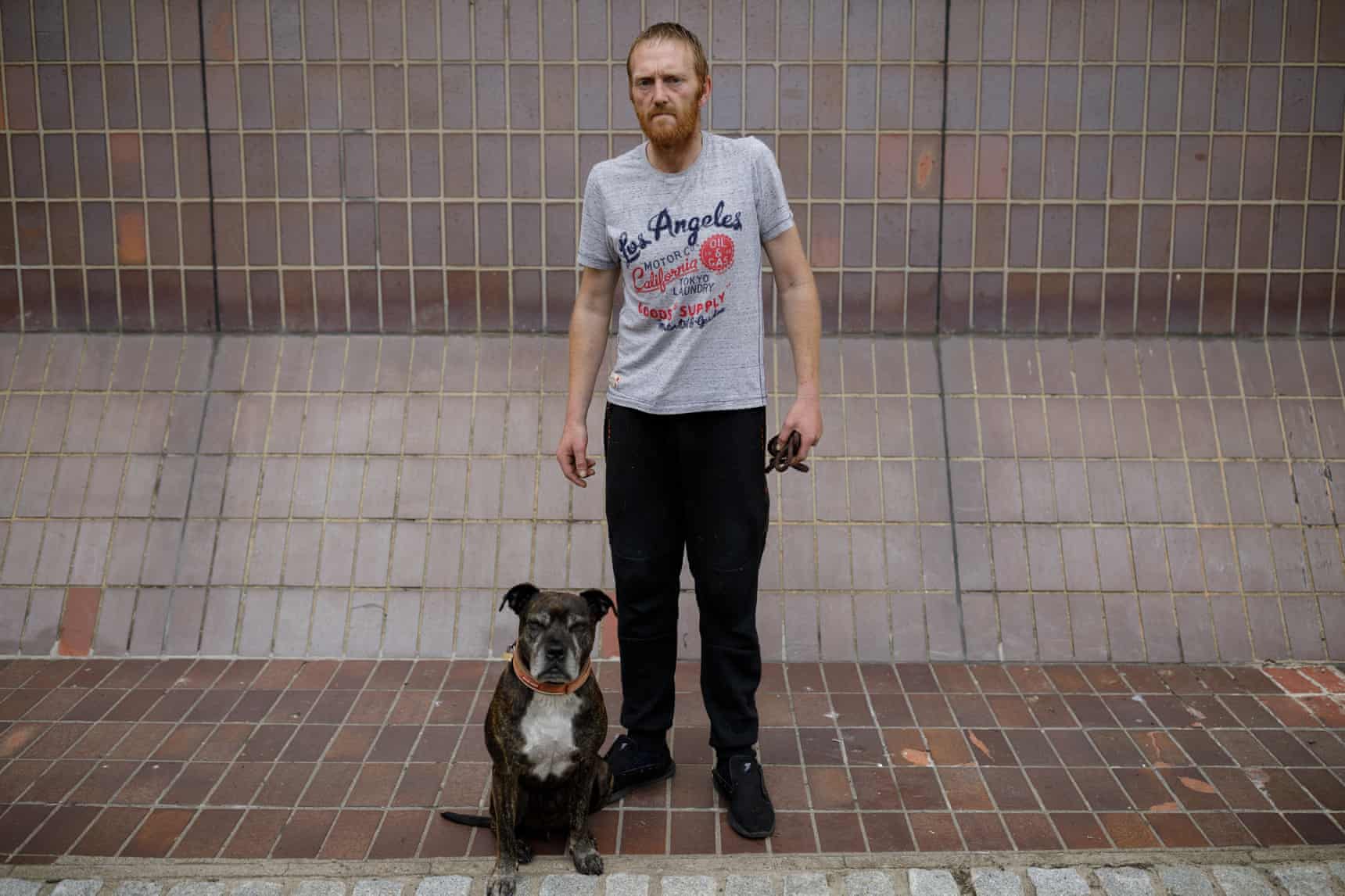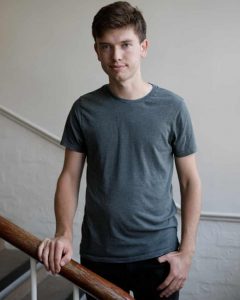A new scheme called Greater Change lets homeless people crowdfund for concrete goals using a QR code and app. Is this the answer to giving in a cashless society?

We’ve all been there. A guy – almost invariably it is a guy – enters your train carriage and announces to anyone who will listen that he is down on his luck, needs a few quid to get a hostel for the night, wasn’t always like this, is trying to get back to some semblance of normality. But is he? Will he use the money for food and lodging, or will it go on drink and drugs – the next shot to get him through the darkness?
The Labour politician Roy Hattersley said it didn’t matter – you should give to someone in need regardless – but many people like to know that the money they are giving won’t fund addictions; that their donation is part of the solution, not feeding the problem. Which is where a new scheme called Greater Change, which is being piloted in Oxford, comes in. It aims to solve two problems: how to enable people to give in an increasingly cashless society; and, perhaps more importantly, how to guarantee that the money being given goes to a concrete objective aimed at getting homeless people back on their feet.
Greater Change is the brainchild of 22-year-old Alex McCallion. While studying economics and management at Jesus College, Oxford, McCallion spent time working with homeless people in the city and developing the idea that he hoped would help at a time when the number of people sleeping rough across the UK is growing rapidly.
From our partners:
“I used to talk to homeless people and a number of issues immediately became clear,” he says. “One was the lack of cash – many people weren’t carrying it any more, so how could they give money? Another was judgment and stigma – being told: ‘You’re just going to spend it on drugs, you’re just going to spend it on alcohol, you’re just being lazy.’ Knowing the people, I realised that, almost always, the stigma is not fair. Quite a lot of the time, they were spending it on drugs or alcohol, but there was a complete lack of understanding of why they were in that situation, of what had led up to it.”

McCallion set about trying to solve these problems and has spent the year since he graduated turning his vision into reality. “What I was floating was a way of receiving money without cash and of showing your real story and what you wanted to spend the money on and save for. Donors needed to see what homeless people were working towards.” That way, they could make not just a one-off charitable donation, but an investment in a person’s future.
Many charities, including other organisations working with homeless people, are fretting about what a cashless society means for fundraising. Various solutions are being tested, including contactless donation stations and giving individual collectors contactless card readers. The answer McCallion came up with was to set up an account in the homeless person’s name and to put their details on a website so donors could contribute, with specific goals such as getting the person into more stable housing and back into work. “Quite a lot of people don’t have bank accounts, but you just need an account to send donations to and for the money to be tagged in such a way that you know who it’s for.”
McCallion teamed up with a social enterprise called Aspire Oxford, which agreed to incubate the project. Aspire acts as a fundholder, with a general fund for donations that are not made to named individuals and restricted funds for donations to specific people. Greater Change has run 11 crow kdfunded campaigns for individuals, raising amounts from about £100 to £1,000 for employment-related courses, identity documents and deposits for housing, and plans to run more. It also recently crowdfunded a coach trip to Bournemouth for 29 homeless people.
As part of McCallion’s scheme, homeless people are given a lanyard that includes a QR code. He has worked with Oxford-based software development company Global Initiative to develop an app that allows passersby to make donations via their phones using the QR code. It is also possible if you don’t have the app, to donate via the website by photographing the code with your phone. Global Initiative did much of the development work for free, with McCallion crowdfunding the rest of the costs and managing to raise enough to pay himself a salary (at living-wage rates) for eight months, although the money has run out and he is no longer paying himself.
Early publicity for the scheme focused on the QR codes, although there is no evidence that they are being widely used: none of the homeless people I spoke to were receiving donations via the app. Critics who saw photographs of homeless people with QR codes around their necks worried it would commodify them, but McCallion rejects such arguments. “Some people are comfortable with it – it’s not that different from office workers wearing ID around their necks – but other people aren’t and there’s no obligation to have one. In any case, you’re not scanning a person, you’re scanning a piece of paper.”
Those signing up for the scheme can provide as much or as little personal information as they like – many provide photos, although not all do, and they can use aliases if they wish. They have caseworkers, via Aspire, who can vouch for their situations. McCallion is convinced that the app and cashless giving will become a major part of the money-raising effort, but there are obstacles. The police in Oxford are assiduous at moving beggars on – I saw several interventions on my tour of homeless hotspots in the town centre – and flashing your QR code to show you have signed up to Greater Change is unlikely to persuade them to let you be. Even hi-tech begging is begging.
Greater Change has been live for three months and McCallion is treating it as a pilot for a national scheme. He is in talks with Homeless Link, an umbrella organisation for homelessness charities, about moving into other cities. He has a vision of homeless people becoming akin to chuggers, with Greater Change logos and lanyards proving they are genuine homeless people striving to get their lives back on track, but this is a long way off. At present, Greater Change is a successful, small-scale crowdfunding operation; the revolution is some way down the road.
McCallion can, though, point to successes. He takes me to a hostel for homeless people in Oxford where I meet some of those with whom he has been working. Terry Hanks, 38, worked as a scaffolder for 15 years. Three years ago, he lost his job, his relationship broke up and he ended up sofa-surfing, then on the streets. He slept rough for two and a half years, begging – he doesn’t shy away from the word – to get enough to eat and to pay for the drugs that he says inevitably become part of your life on the streets. “I started taking crack and weed,” he says. “I hadn’t taken hard drugs before, but on the streets you need them just to get to sleep. I used to make sometimes £20 a day, sometimes £100, but it would almost all go on drugs.”

Hanks eventually got a place in the hostel and was introduced to Aspire. He is now on a programme to get off drugs and is trying to get back into work. He put a brief biography on the Greater Change website and launched an appeal for money to get ID. He hopes to raise more to get himself decent shoes and clothes to make himself more presentable. He says his fall into joblessness and homelessness was sudden, but getting back on the ladder is tough. “You can’t get a job with no address, so you can’t earn the money to get a place to live.” He hopes the money raised through Greater Change will break that vicious circle.
Sharron Maasz, another long-term resident at the hostel after years on the streets, has a fund to get ID and a dictaphone. She wants to write a book recording her experiences, but arthritis makes writing difficult. She wanted to get a laptop with voice-recognition software, but her caseworker thought a laptop would soon disappear in the hostel, so they settled on a dictaphone instead. Transcription will have to come later.
Maasz, who is 44 and has three grownup children, has been homeless for almost 10 years. She hopes to do voluntary work with Aspire and to get out of the hostel and into more stable accommodation, but most of all she wants to write the book. “I just want to get my life sorted,” she says. “I want to put a lid on all the chaos. I’ve had enough.” She presents the book as a kind of catharsis after all she has been through – violence, a nervous breakdown, crack addiction. “I’ve always wanted to get clean, but it’s not as simple as that if you’ve got mental health issues and you’re living like this, being pushed from pillar to post,” she says.
McCallion provides what he calls “catalyst funding” – giving money for something specific that can make a difference to someone’s circumstances. He puts me in touch with 21-year-old Callum Mawle, who, with the help of Aspire and money raised by Greater Change, has started working as a security guard at one of the University of Oxford’s buildings. Mawle had been in foster care before moving back to live with his mother, but the relationship wasn’t working out and he was deemed to be in danger of homelessness (one of Aspire’s key aims is to prevent people going on to the streets in the first place). He moved to a hostel in Witney, 10 miles west of Oxford, started doing gardening and other work with Aspire, “so I wasn’t bumming around the whole time”, identified security as something he could go into, and raised money via Greater Change to do the necessary courses and get accredited by the Security Industry Authority.
For McCallion, the key is to humanise the plight of homeless people. “Their biog is there [on the website and on the app, if you scan the code] to make sure there is an interaction,” he says. “If you are giving money from just observing, nine times out of 10 you’ll just carry on walking, and that’s not a nice situation for either of the people. If you can increase the amount of interaction, that’s the best way to tackle the stigma and get people to care more. Weirdly for a tech product, this is a much more human way of doing it.”
This feature is written by Stephen Moss & originally appeared in The Guardian.


















